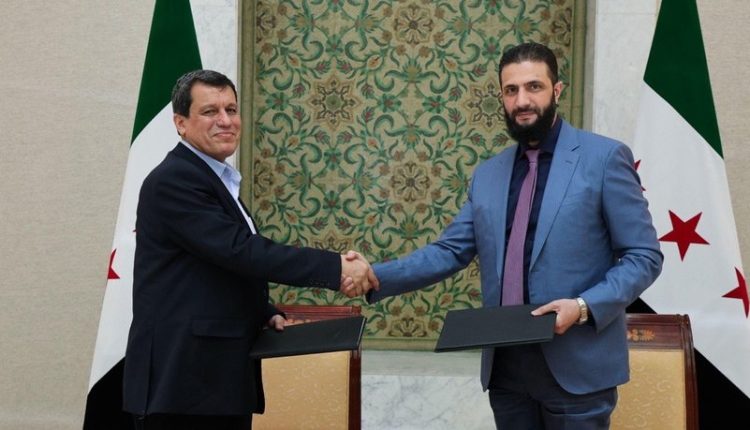Mazloum Abdi Meets Syrian Government Committee to Implement Integration Agreement
By Kardo Roj
HASAKAH, Syria (North Press) – General Mazloum Abdi, Commander-in-Chief of the Syrian Democratic Forces (SDF), met Wednesday with a Syrian government committee tasked with overseeing the implementation of the recent agreement between the SDF and Syrian Transitional President Ahmad al-Sharaa, the SDF announced.
The agreement, signed on March 10, outlines a framework for integrating SDF-affiliated civil and military structures into the Syrian state. The deal has garnered significant regional and international support, signaling a potential shift in governance dynamics in northeast Syria.
According to an official SDF statement, the meeting was attended by senior representatives from both sides, including Rohilat Afrin, a senior commander in the Women’s Protection Units (YPJ), and Hussein Salama, head of the Syrian government’s negotiating committee.
Participants discussed mechanisms for joint committee operations, which are set to commence in early April. The agenda focused on practical steps for the agreement’s implementation, as well as broader political considerations, including constitutional reforms.
“The meeting emphasized the importance of ensuring that no Syrian component is excluded from shaping the country’s future,” the statement read, highlighting discussions on political participation and representation in Syria’s post-war governance structure.
Another key topic was the necessity of a comprehensive ceasefire across Syrian territory. While the northeast remains relatively stable under the governance of the Autonomous Administration of North and East Syria (AANES), other parts of Syria continue to witness hostilities, particularly in regions controlled by Turkish-backed factions and areas of ongoing conflict between government forces and opposition groups.
The SDF and AANES have long advocated for a political resolution that ensures stability and security while maintaining the region’s autonomous institutions. The latest agreement with Damascus is seen as a potential step toward a broader settlement, though challenges remain in bridging differences between the two sides.
The agreement between Abdi and al-Sharaa has been welcomed by several Arab and international actors who view it as a stabilizing factor in Syria’s complex political landscape. However, questions persist over how its terms will be implemented, particularly concerning military integration and governance structures in northeast Syria.
Observers note that while the deal signals potential rapprochement, its long-term success will depend on sustained negotiations, mutual trust-building, and broader reconciliation efforts among Syria’s various factions.
As the April deadline for committee operations approaches, all eyes will be on whether this process can lead to tangible changes on the ground.

